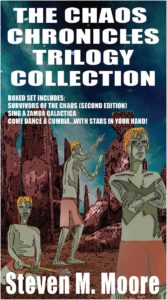Prescient writing or unheeded warnings?
Many times sci-fi writers get it right. Arthur C. Clarke’s comsats are now ubiquitous, Theodore Sturgeon’s spread-spectrum communications is tech in hand every time you pick up your cellphone, and Isaac Asimov’s robots have morphed into assembly-line miracles and precision surgical tools.
Bioengineering is the name of the game in the 21st century. Cloning and specially designed plants and animals generate lots of debate, but they will occur, for better or worse. In my “Clones and Mutants Series,” the clones are human and the mutant is a super soldier. Together with smart armor and weapons, the latter might change wartime battlefields, as if we needed to improve killing efficiency.

My “Mary Jo Melendez Mysteries” focus on another warfare possibility–MECHs, or “Mechanically Enhanced Cybernetic Humans.” Advances in robotics lead to advances in prosthetics, and one can imagine all kinds of possibilities there too.
In my recent novel The Last Humans, a region already scarred by fires and quakes is part of the post-apocalyptic SoCal landscape. Post-apocalyptic is a subgenre of sci-fi, and the genre is known for extrapolating current science and technology to the future.
But sci-fi writers don’t necessarily want to get it right! Extrapolations can go in many directions, and when they take us to places most of us don’t want to go in our creative imaginations, they reduce to warnings we writers broadcast to readers and society in general, warnings that boil down to, “If we continue along this path, bad things will happen.”
Huxley started all this in Brave New World, depicting a population made docile with drugs—not exactly marijuana legalization or the opioid crisis, but close enough, especially if all the anti-depression drugs on the market are considered—is the whole world going crazy? I don’t think so, but Big Pharma is selling anti-depressants even to little kids to make a buck.
Orwell wrote about doublespeak, Bradbury about book burning. The first still plagues us today, evidence in the spin doctors debating the differences between quid pro quo and bribery. Book burning isn’t necessary because readership is down, with most otherwise intelligent people, especially millennials, limiting their reading to tweets, not books.
Are writers really prescient? Or are they just keen observers of human nature who warn us about the worst that can happen if we don’t change our ways? I certainly can’t gloat about my fire-scarred landscape in The Last Humans becoming the new normal in my beloved native state of California. I’m sure no sci-fi author really wants to say, “I told you so.”

In one of my first novels, Survivors of the Chaos (now the first book in the ebook bundle The Chaos Chronicles Trilogy Collection), multinationals have taken over the world, using their mercenaries to control everyone—and here I just wrote an article in this blog about tech giants being too big! In that same novel, I mention dikes on the East River keeping the seawater out of Manhattan. That story originated in a 2003 manuscript because I saw the perils of multinationals and climate change, but I never imagined that we might be beyond the tipping point for the latter sixteen years later. Recent events in the magnificent city of Venice show some places are far beyond the tipping point (the Italian government’s dragging its heels about a dike construction didn’t help). Needless to say, my warnings—or anyone else’s—have not been heeded, we’re being controlled by multinationals and pulling out of the Paris Climate Accord, and a little Swedish girl is correctly blasting politicians worldwide for stealing her contemporaries’ future! Or present, as the case may be.
A sci-fi author can only do so much. Maybe people are so happy, happy, happy that the Star Trek communicator became their smart phone, the first drug of choice for billions, that they ignore the warnings. Dunno. I never had a smart phone. Never will. I prefer to write sci-fi, even if no one heeds my warnings. Mind you, I’m not prescient. I’m just an observer of humanity’s foibles. It’s not hard to extrapolate those to the end of humanity in this galaxy. Let’s hope that such an extrapolation is incorrect.
***
Comments are always welcome.

Evergreen Series: “Clones and Mutants.” The clones are victims of a secret government conspiracy in Full Medical. The mutant appears in Evil Agenda as a sinister businessman endeavors to create the super soldier. And the clones and mutant team up to stop an industrialist out for revenge against the West in No Amber Waves of Grain. All books are evergreen—novels as current today as when I wrote them…maybe even more so. Available on Amazon and everywhere ebooks are sold.
Around the world and to the stars! In libris libertas!
